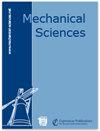缆索驱动体重支撑步态训练机器人的运动规划与控制策略
IF 1.5
4区 工程技术
Q4 ENGINEERING, MECHANICAL
引用次数: 0
摘要
摘要本文设计了一种缆索驱动的体重支撑步态训练机器人(C-BWSGTR),为患者提供部分体重支撑和一种稳定的步态训练驱动力;这个装置使那些病人又能走路了。首先,确定了C-BWSGTR的总体构型,建立了机器人的结构组成和工作原理。其次,采用矢量代数方法对C-BWSGTR进行运动学分析,建立其数学模型;同时计算患者步态训练过程中每根缆索的位移。第三,采用基于s型速度曲线的时相分布关系,分阶段进行C-BWSGTR的运动规划。同时,计算患者步态训练过程中各缆索的位移、速度和加速度,生成相应的变化曲线。最后,通过分析机器人前向通道传递函数的动态特性,设计了C-BWSGTR的位置伺服复合控制策略。仿真分析和样机实验验证了所设计的复合位置伺服控制策略能够满足系统的稳定性和对加载指令的快速响应要求。本文章由计算机程序翻译,如有差异,请以英文原文为准。
Motion planning and control strategy of a cable-driven body weight support gait training robot
Abstract. In this paper, a cable-driven body weight support gait training robot (C-BWSGTR) that provides patients with partial body weight support as well as a kind of stable gait training driving force was designed; this device enabled those patients to walk again. Firstly, the overall configuration of the C-BWSGTR was determined, and the structural composition and working principle of the robot were established. Secondly, the vector algebra method was applied to carry out the kinematic analysis and establish the mathematical model of the C-BWSGTR. The displacement of each cable during the patient gait training was also calculated. Thirdly, the motion planning of the C-BWSGTR was carried out in stages, using the time–phase distribution relationship based on an S-shaped speed curve. Meanwhile, the displacement, speed, and acceleration of each cable during the patient gait training were calculated and corresponding change curves were generated. Finally, a position servo composite control strategy for the C-BWSGTR was designed by analyzing the robot's dynamic characteristics of the forward channel transfer function. The simulation analysis and prototype experiment in this paper verified that the designed composite position servo control strategy can meet the requirements of the system with respect to stability and a fast response of the system to the loading command.
求助全文
通过发布文献求助,成功后即可免费获取论文全文。
去求助
来源期刊

Mechanical Sciences
ENGINEERING, MECHANICAL-
CiteScore
2.20
自引率
7.10%
发文量
74
审稿时长
29 weeks
期刊介绍:
The journal Mechanical Sciences (MS) is an international forum for the dissemination of original contributions in the field of theoretical and applied mechanics. Its main ambition is to provide a platform for young researchers to build up a portfolio of high-quality peer-reviewed journal articles. To this end we employ an open-access publication model with moderate page charges, aiming for fast publication and great citation opportunities. A large board of reputable editors makes this possible. The journal will also publish special issues dealing with the current state of the art and future research directions in mechanical sciences. While in-depth research articles are preferred, review articles and short communications will also be considered. We intend and believe to provide a means of publication which complements established journals in the field.
 求助内容:
求助内容: 应助结果提醒方式:
应助结果提醒方式:


